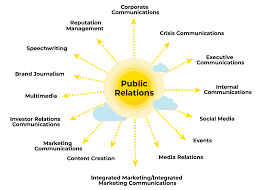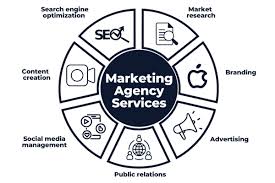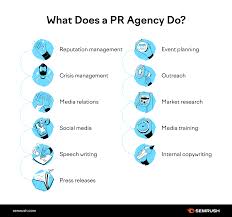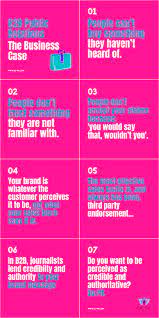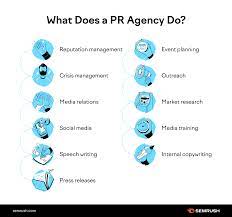Public Relations Agency Services: Building Strong Brands and Effective Communication
In today’s fast-paced and competitive business environment, effective communication plays a crucial role in the success of any organization. Public relations (PR) is a strategic discipline that focuses on managing and enhancing the reputation of businesses, individuals, or brands through various communication channels. To achieve this, many businesses turn to public relations agencies for their expertise and specialized services.
A public relations agency serves as a valuable partner in helping businesses navigate the complex landscape of communication. These agencies are equipped with skilled professionals who possess a deep understanding of media relations, crisis management, brand positioning, and strategic messaging. They have the knowledge and experience to craft compelling narratives that resonate with target audiences and build strong relationships between organizations and their stakeholders.
One of the primary services offered by PR agencies is media relations. These agencies have established relationships with journalists, editors, and influencers across different industries. Through these connections, they can secure media coverage for their clients, whether it be in newspapers, magazines, online publications, or broadcast media. By leveraging these relationships effectively, PR agencies can help businesses gain valuable exposure and increase brand visibility.
Another key service provided by PR agencies is crisis management. In today’s digital age where news spreads rapidly through social media platforms, companies need to be prepared for potential crises that can damage their reputation. PR agencies are well-versed in handling such situations swiftly and effectively. They develop comprehensive crisis communication plans, provide guidance during challenging times, and work towards minimizing negative impact while maintaining transparency.
Brand positioning is another area where PR agencies excel. They help businesses identify their unique value proposition and create a compelling brand narrative that resonates with target audiences. Through strategic messaging and storytelling techniques, PR agencies can shape public perception of a brand while differentiating it from competitors.
PR agencies also play a vital role in thought leadership development. By identifying subject matter experts within an organization or industry, they position these individuals as trusted authorities in their respective fields. This can be achieved through securing speaking engagements, contributing to industry publications, and facilitating interviews with relevant media outlets. Thought leadership not only enhances a brand’s reputation but also establishes credibility and fosters trust among key stakeholders.
Additionally, PR agencies offer content creation and distribution services. They develop engaging content, such as press releases, articles, blog posts, and social media content that aligns with the brand’s messaging and resonates with the target audience. These agencies also leverage their network of media contacts to distribute this content effectively, ensuring maximum reach and engagement.
In conclusion, public relations agency services are essential for businesses seeking to build strong brands and establish effective communication strategies. By leveraging their expertise in media relations, crisis management, brand positioning, thought leadership development, and content creation, PR agencies help businesses navigate the ever-changing landscape of communication successfully. With their strategic guidance and creative approach, PR agencies play a pivotal role in shaping public perception while driving growth and success for their clients.
Advantages of Public Relations Agency Services in the UK
- Increased visibility
- Improved customer relationships
- Enhanced reputation
- Cost effective communication
- Professional expertise
Challenges of Public Relations Agency Services: Cost, Lack of Control, and Conflict of Interests
- Cost
- Lack of Control
- Conflict of Interests
Increased visibility
Increased Visibility: How a PR Agency Can Elevate Your Brand’s Presence
In today’s competitive business landscape, standing out from the crowd is crucial for success. This is where a public relations (PR) agency can make a significant impact. One of the key advantages of engaging a PR agency is the increased visibility it can bring to your company, products, or services. By leveraging their expertise and networks, PR agencies have the power to elevate your brand’s presence and give it greater recognition in the marketplace.
A PR agency understands the importance of strategic communication and knows how to craft compelling narratives that resonate with your target audience. Through their media relations efforts, they can secure valuable media coverage for your brand across various platforms such as newspapers, magazines, online publications, and broadcast media. This exposure not only increases your brand’s visibility but also enhances its credibility and reputation.
By working closely with journalists, editors, and influencers in your industry, a PR agency can position your brand as an authoritative voice. They identify opportunities for thought leadership development and help you establish yourself as an expert in your field. Through speaking engagements, contributed articles, interviews, and other thought leadership initiatives, they ensure that your brand’s message reaches a wider audience.
Furthermore, a PR agency excels at identifying unique angles and stories within your business that can generate media interest. They know how to package these stories effectively to capture attention and secure media coverage that highlights the value of your products or services. This increased visibility not only attracts potential customers but also helps build trust with existing ones.
In addition to traditional media channels, PR agencies are adept at navigating the digital landscape. They understand the power of social media platforms and digital marketing strategies in amplifying brand visibility. By creating engaging content tailored for online audiences and utilizing social media influencers or bloggers relevant to your industry, they can extend your reach even further.
The increased visibility provided by a PR agency has numerous benefits for businesses. It can lead to heightened brand awareness, increased website traffic, and improved lead generation. As your brand gains recognition in the marketplace, it creates opportunities for partnerships, collaborations, and industry recognition that can further propel your growth.
In conclusion, engaging a PR agency offers the advantage of increased visibility for your brand. Through their strategic communication efforts, media relations expertise, and digital marketing know-how, they can raise your brand’s profile and give it the recognition it deserves in the marketplace. With enhanced visibility comes a host of opportunities that can drive business growth and success.
Improved customer relationships
Improved Customer Relationships: Strengthening Loyalty and Trust through PR Agency Services
In today’s competitive business landscape, building strong relationships with customers is crucial for the long-term success of any company. This is where the expertise of a public relations (PR) agency comes into play. One significant advantage of PR agency services is their ability to create positive relationships between customers and a company, ultimately strengthening loyalty and trust in the brand.
A PR agency understands the importance of effective communication in nurturing customer relationships. They have the skills and knowledge to develop targeted messaging that resonates with customers, ensuring that they feel valued and understood. Through strategic storytelling and engaging content, PR agencies can convey a brand’s values, mission, and commitment to customer satisfaction.
By crafting compelling narratives that highlight a company’s unique selling points and customer-centric approach, PR agencies help businesses establish an emotional connection with their target audience. This emotional connection fosters a sense of loyalty among customers, making them more likely to choose the brand over its competitors.
Furthermore, PR agencies play a crucial role in managing customer perceptions during challenging times or crisis situations. They act as a bridge between companies and their customers, providing transparent communication and timely updates. By addressing concerns proactively and demonstrating accountability, PR agencies help maintain trust even in difficult circumstances.
PR agencies also excel at leveraging various communication channels to engage with customers effectively. Whether it’s through traditional media outlets, social media platforms, or direct engagement at events or conferences, these agencies ensure that the right messages reach the right people at the right time. This multi-channel approach allows companies to connect with their customers on multiple levels, fostering stronger relationships built on trust and mutual understanding.
Moreover, PR agencies can assist businesses in implementing customer feedback mechanisms. By actively listening to customer opinions and concerns, companies can tailor their products or services to better meet customer needs. A PR agency can help facilitate this feedback loop by conducting surveys or organizing focus groups, ensuring that the voice of the customer is heard and acted upon.
In conclusion, one significant benefit of PR agency services is their ability to improve customer relationships. By creating positive interactions and fostering a sense of loyalty and trust, PR agencies help businesses build long-lasting connections with their customers. Through strategic communication, transparent crisis management, and active engagement, PR agencies play a vital role in strengthening customer relationships and enhancing brand reputation. With their expertise in understanding customer needs and crafting compelling narratives, PR agencies are invaluable partners in establishing a strong foundation for business success.
Enhanced reputation
Enhanced Reputation: The Power of a PR Agency
In today’s highly competitive business landscape, reputation is everything. A positive reputation can be the key differentiator that sets your business apart from the competition and attracts loyal customers. This is where the expertise of a public relations (PR) agency comes into play.
One significant advantage of engaging a PR agency is their ability to enhance and maintain a good reputation for your business. These agencies have a deep understanding of effective communication strategies and know how to craft accurate and compelling messages that resonate with your target audience.
A PR agency can help shape public perception by providing accurate information about your organization, products, or services. They are skilled in developing key messages that highlight your strengths, values, and unique selling points. By consistently delivering these messages through various channels, such as media outlets or social media platforms, they can create a positive image for your brand.
Moreover, PR agencies are experts in managing crisis situations that could potentially damage your reputation. They have the experience and knowledge to handle challenging scenarios swiftly and effectively. In times of crisis, having a PR agency by your side can make all the difference in preserving your brand’s image and maintaining trust with stakeholders.
Building a strong reputation takes time and effort. A PR agency understands this process and has the resources to implement long-term strategies that contribute to reputation enhancement. They can identify opportunities for positive exposure through media coverage, thought leadership initiatives, or community engagement activities.
Additionally, a PR agency has established relationships with journalists, influencers, bloggers, and other relevant contacts in the media industry. Leveraging these connections allows them to secure valuable media coverage for your business. Positive news stories or features about your company can greatly impact how you are perceived by both existing customers and potential clients.
In conclusion, partnering with a PR agency offers numerous benefits when it comes to enhancing your business’s reputation. Their expertise in crafting accurate messages, managing crises effectively, and leveraging media relationships can significantly contribute to building and maintaining a positive image for your brand. A strong reputation not only attracts customers but also instills trust and confidence in your organization. With the help of a PR agency, you can elevate your reputation and stand out in a crowded marketplace.
Cost effective communication
Cost Effective Communication: The Value of Working with a PR Agency
In today’s competitive business landscape, effective communication is vital for success. Many businesses recognize the importance of public relations (PR) in building their brand and reputation. However, attempting to handle all aspects of PR in-house can be daunting and costly. This is where the value of working with an experienced PR agency becomes evident.
One significant advantage of partnering with a PR agency is cost-effective communication. These agencies have access to resources and expertise that may not be available internally within a company. By leveraging their network of media contacts, industry insights, and specialized tools, PR agencies can streamline communication efforts while maximizing results.
Firstly, PR agencies have established relationships with journalists, editors, and influencers across various industries. These connections are built over time and allow agencies to secure media coverage more efficiently than if a company were to approach them directly. By tapping into these networks, businesses can gain valuable exposure without having to invest significant amounts of time and resources in building relationships from scratch.
Moreover, PR agencies possess extensive knowledge and experience in crafting compelling narratives that resonate with target audiences. They understand how to shape messages effectively for different platforms and channels while maintaining consistency across all communications. This expertise ensures that businesses make the most impact with their audience while avoiding costly mistakes or miscommunication.
Additionally, PR agencies have access to specialized tools and technologies that aid in monitoring media coverage, analyzing sentiment, tracking trends, and measuring the effectiveness of communication campaigns. These resources enable businesses to gain valuable insights into their brand’s performance and make data-driven decisions without investing in expensive software or training.
Working with a PR agency also allows companies to tap into a diverse team of professionals who bring different skills and perspectives to the table. Instead of hiring individual employees for each aspect of PR (such as media relations, content creation, or crisis management), businesses can rely on the collective expertise of an agency’s team at a fraction of the cost. This not only saves money but also ensures that all aspects of communication are handled by experienced professionals who understand the nuances of PR.
In conclusion, partnering with a PR agency offers businesses a cost-effective approach to communication. By leveraging their resources, expertise, and established networks, PR agencies can deliver impactful results while minimizing costs. From securing media coverage to crafting compelling narratives and leveraging specialized tools, working with a PR agency provides businesses with access to a comprehensive suite of services that may not be feasible to develop in-house. Ultimately, this allows companies to focus on their core competencies while leaving the complexities of communication in the hands of trusted professionals.
Professional expertise
Professional Expertise: The Power of PR Agency Services
In today’s fast-paced and interconnected world, effective communication is paramount for businesses aiming to thrive and stand out from the competition. This is where the professional expertise of a public relations (PR) agency comes into play. With their wealth of experience and specialized skills, PR agencies are well-equipped to handle complex communication tasks, making them invaluable partners for businesses seeking to navigate the ever-evolving landscape of public perception.
One key advantage of engaging a PR agency is their ability to handle crisis management with finesse. In times of unexpected challenges or negative publicity, businesses often find themselves in need of swift and strategic action. A PR agency’s expertise lies in developing comprehensive crisis communication plans that enable companies to effectively address issues while minimizing damage to their reputation. By providing guidance, crafting timely messaging, and engaging with stakeholders transparently, PR agencies help organizations weather storms and emerge stronger.
Media relations is another area where a PR agency’s professional expertise shines through. These agencies have cultivated strong relationships with journalists, editors, and influencers across various industries. By leveraging these connections, they can secure media coverage for their clients in prominent publications or through broadcast media channels. With their understanding of what makes a story newsworthy and their ability to craft compelling narratives, PR agencies help businesses gain valuable exposure and enhance brand visibility.
Furthermore, event management is a specialized skill that many PR agencies excel at. From product launches to press conferences and industry events, these agencies have the know-how to plan and execute successful events that capture attention and generate buzz. Their attention to detail ensures that every aspect of an event aligns with the brand’s messaging while creating memorable experiences for attendees.
In today’s digital age, social media has become an integral part of any comprehensive communication strategy. However, navigating social media platforms effectively requires expertise in understanding trends, engaging with audiences authentically, and managing online reputation. PR agencies bring their knowledge of social media best practices to the table, creating and implementing impactful campaigns that resonate with target audiences and drive engagement.
Ultimately, the professional expertise of a PR agency allows businesses to focus on their core operations while leaving the intricacies of communication in capable hands. With their experience in crisis management, media relations, event management, and social media campaigns, PR agencies provide businesses with a competitive edge. By harnessing their expertise, organizations can effectively shape public perception, build strong relationships with stakeholders, and achieve their communication goals.
In a world where effective communication is vital for success, partnering with a PR agency ensures that businesses have access to the professional skills needed to navigate complex communication challenges. With their expertise and experience in diverse areas of communication, PR agencies empower businesses to tell their stories effectively and build lasting connections with their target audience.
Cost
Cost: A Consideration When Hiring a Public Relations Agency
When it comes to hiring a public relations agency, one of the primary concerns for businesses is the cost involved. It’s no secret that engaging the services of a PR agency can be expensive, and this financial investment may not always fit within the budget constraints of some businesses.
Public relations agencies offer a range of specialized services, including media relations, crisis management, brand positioning, and content creation. These services require skilled professionals with industry expertise and experience. The cost associated with hiring such professionals, along with the agency’s overhead expenses, can contribute to the higher price tag of their services.
For small or start-up businesses with limited financial resources, allocating a significant portion of their budget towards PR agency fees may not be feasible. In such cases, businesses might need to explore alternative options or consider in-house PR efforts until they have the financial means to engage an agency.
It’s important to note that while cost is a valid consideration, there are potential downsides to not investing in professional PR services. Without dedicated PR expertise, businesses may struggle to effectively manage their reputation and communicate their brand message to target audiences. This could hinder their ability to gain media coverage, build relationships with key stakeholders, and differentiate themselves from competitors.
However, it’s worth mentioning that not all businesses necessarily require ongoing PR agency support. For some companies with specific short-term goals or projects, it might be more cost-effective to seek project-based PR assistance rather than committing to long-term contracts. This way, they can benefit from professional PR guidance without incurring excessive costs.
Another option for businesses on a tight budget is to consider working with freelance PR professionals or consultants who offer more flexible pricing structures compared to larger agencies. Freelancers often bring valuable expertise and experience while being able to tailor their services according to specific needs and budgets.
Ultimately, when considering whether or not to hire a public relations agency based on cost, businesses need to carefully evaluate their specific goals, resources, and priorities. It may be necessary to weigh the potential benefits of professional PR services against the financial investment required. Open communication with PR agencies about budget limitations can also help in exploring possible solutions or alternative arrangements.
In conclusion, cost is indeed a significant consideration when contemplating hiring a public relations agency. While it may not be within the budget of every business, exploring alternative options like project-based assistance or working with freelance professionals can help mitigate costs while still benefiting from valuable PR expertise. Ultimately, businesses need to find a balance between their financial resources and the importance of effective communication and reputation management in achieving their overall objectives.
Lack of Control
Lack of Control: A Challenge in Public Relations Agency Services
When businesses decide to engage the services of a public relations (PR) agency, they often do so with the expectation of gaining expert guidance and support in managing their communication efforts. However, one potential drawback that businesses may encounter when working with an agency is a lack of control over their message and how it is communicated.
In the dynamic world of PR, agencies act as intermediaries between businesses and the media. While this can bring numerous benefits, it also means that businesses must relinquish some control over their messaging. PR agencies have a deep understanding of the media landscape and know how to craft messages that align with journalists’ interests and preferences. As a result, businesses may find themselves having to trust the agency’s expertise and rely on their judgment when it comes to shaping their brand’s narrative.
This lack of control can be challenging for businesses that are accustomed to having full autonomy over their communication strategies. It requires them to place trust in the agency’s ability to accurately represent their brand and convey key messages effectively. Businesses must be willing to collaborate closely with the agency, providing them with necessary information and insights while allowing them the flexibility to adapt the messaging for different media platforms.
Another aspect where lack of control can arise is in crisis situations. When faced with a reputational crisis, businesses may feel compelled to take immediate action and manage communication directly. However, in such cases, PR agencies often advise caution and advocate for a more strategic approach. This can sometimes lead to disagreements regarding timing or specific messaging choices, as agencies prioritize long-term reputation management over short-term responses.
It is important for businesses considering working with a PR agency to understand this potential challenge upfront. Open communication between both parties is crucial in establishing mutual trust and ensuring that expectations are aligned from the outset. By maintaining transparency and fostering strong relationships, businesses can mitigate some of these concerns while still benefiting from the expertise that PR agencies bring to the table.
In conclusion, while public relations agency services offer numerous advantages, a lack of control over messaging and communication can be a potential con. Businesses must be prepared to trust the agency’s expertise and collaborate closely with them to ensure that their brand’s narrative is accurately represented. By establishing clear lines of communication and maintaining transparency, businesses can strike a balance between relinquishing control and leveraging the agency’s knowledge to achieve their communication goals effectively.
Conflict of Interests
Conflict of Interests: A Challenge in Public Relations Agency Services
Public relations agencies are often sought after for their expertise in managing communication strategies and campaigns for businesses across various industries. However, one potential con that arises from working with these agencies is the presence of conflicts of interest. It is not uncommon for PR agencies to handle multiple clients within the same industry, which can pose challenges when it comes to managing campaigns and strategies effectively.
When an agency represents multiple clients within the same industry, conflicts of interest may arise due to competing interests or objectives. These conflicts can potentially compromise the agency’s ability to provide unbiased advice and impartial guidance. The agency may find itself in a position where it needs to balance the needs and priorities of different clients, possibly leading to compromises or skewed recommendations.
One significant concern with conflicts of interest is the risk of information leakage. Agencies that work with competitors or similar businesses might inadvertently share sensitive information between clients, breaching confidentiality agreements and damaging trust. This can be particularly problematic when dealing with proprietary information, future product launches, or market strategies that need to remain confidential.
Another challenge arising from conflicts of interest is the potential dilution of resources and attention. When an agency has multiple clients within the same industry, resources such as time, manpower, and expertise need to be divided among them. This division can result in limited availability or reduced focus on any one client’s specific needs or goals.
Furthermore, conflicts of interest may hinder creativity and innovation within an agency. When working with similar clients in the same industry, there is a risk of falling into repetitive patterns or relying on tried-and-tested approaches rather than exploring new ideas tailored to each client’s unique requirements. This lack of fresh perspectives can limit the effectiveness and impact of communication strategies.
To mitigate these challenges, public relations agencies should have robust policies and procedures in place to manage conflicts of interest effectively. They must establish clear guidelines on client representation within specific industries and ensure transparency with all parties involved. Agencies should also prioritize confidentiality and information security, implementing measures to prevent data leakage or breaches.
Moreover, agencies should strive to maintain open and honest communication with their clients, addressing any potential conflicts of interest upfront. This includes being transparent about their existing client roster and how they plan to manage any potential conflicts. By setting clear expectations and managing client relationships ethically, agencies can work towards minimizing the negative impact of conflicts of interest.
In conclusion, while public relations agencies offer valuable services in managing communication strategies for businesses, conflicts of interest can pose challenges. The presence of multiple clients within the same industry brings the risk of compromised advice, information leakage, diluted resources, and limited creativity. However, with proper policies, transparency, and effective communication, agencies can navigate these challenges and provide quality services to their clients while maintaining ethical standards.





